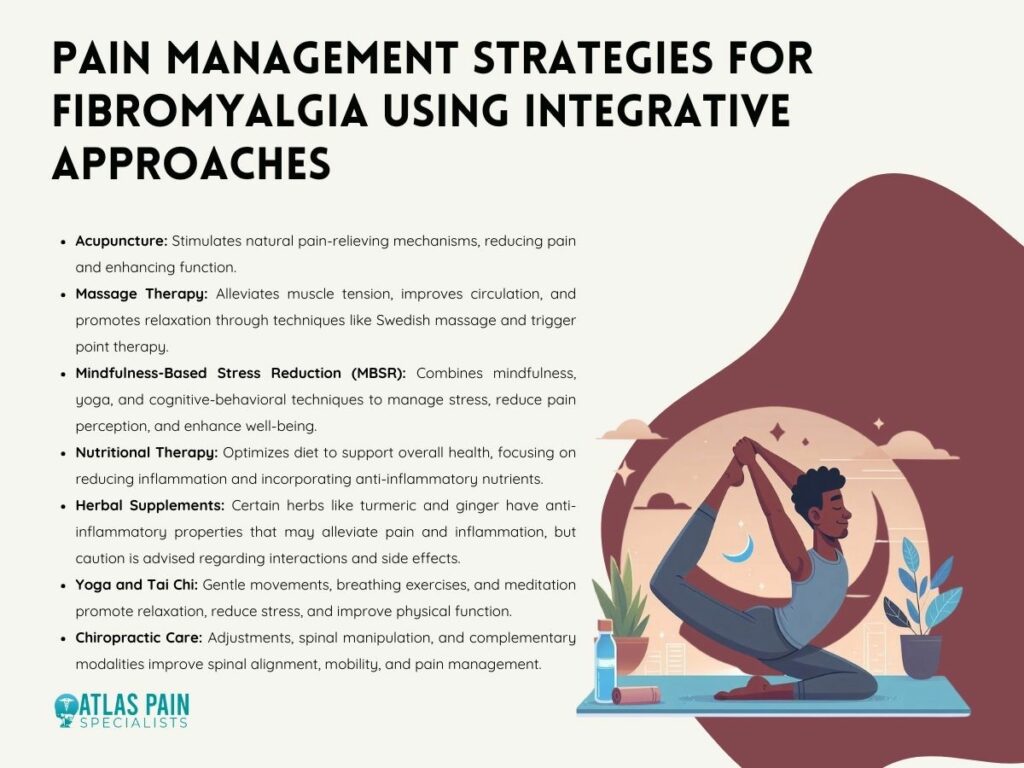

Integrative Approaches to Fibromyalgia Pain Management
Fibromyalgia is a chronic disorder characterized by widespread musculoskeletal pain, fatigue, sleep disturbances, and cognitive difficulties. It affects millions of people worldwide, predominantly women, and can significantly impact their quality of life.
While there is no known cure for fibromyalgia, a multidisciplinary approach that integrates conventional medical treatments with complementary and alternative therapies offers a promising avenue for managing symptoms and improving overall well-being.
This article explores various integrative approaches to fibromyalgia pain management, highlighting their benefits and potential effectiveness.
Understanding Fibromyalgia
Before delving into integrative approaches to fibromyalgia pain management, it's crucial to understand the condition itself. Fibromyalgia is characterized by widespread pain, typically accompanied by fatigue, sleep disturbances, cognitive difficulties, and mood disorders such as depression and anxiety.
While the exact cause of fibromyalgia remains unknown, it is believed to involve abnormalities in the way the brain and nervous system process pain signals. Factors such as genetics, physical trauma, infections, and psychological stress may contribute to the development of fibromyalgia. Despite ongoing research efforts, fibromyalgia remains a complex and challenging condition to diagnose and treat.
Conventional Treatments for Fibromyalgia
Fibromyalgia, a chronic condition characterized by widespread pain and various accompanying symptoms, is managed through several conventional treatment methods:

1. Medication
Pain management often involves prescription medications such as analgesics, antidepressants, and anti-seizure drugs to alleviate pain, improve sleep, and address mood disturbances.
2. Exercise
Incorporating regular, low-impact exercises like walking, swimming, or yoga can improve muscle strength, flexibility, and overall well-being while reducing pain levels.
3. Cognitive-Behavioral Therapy (CBT)
CBT helps individuals develop coping mechanisms, manage stress, and address negative thought patterns associated with fibromyalgia, leading to improved symptom management and overall quality of life.
4. Lifestyle Adjustments
Implementing lifestyle changes like stress reduction techniques, optimizing sleep hygiene, and maintaining a balanced diet can complement conventional treatments and alleviate fibromyalgia symptoms.
By combining these conventional approaches, individuals with fibromyalgia can effectively manage their condition and enhance their daily functioning and quality of life. Working closely with healthcare professionals to tailor treatment plans to individual needs is crucial for optimal outcomes.
Pain Management Strategies for Fibromyalgia Using Integrative Approaches
Integrative medicine takes a holistic approach to healthcare, emphasizing the integration of conventional and complementary therapies to address the physical, emotional, and spiritual aspects of health. Several complementary and alternative therapies have shown promise in managing fibromyalgia symptoms and improving overall well-being.
Here are some integrative approaches that individuals with fibromyalgia may consider incorporating into their treatment plans:

1. Acupuncture
Acupuncture, an ancient Chinese practice involving the insertion of thin needles into specific points on the body, has been shown to help reduce pain and improve function in individuals with fibromyalgia. It is believed to stimulate the body's natural pain-relieving mechanisms and promote relaxation.
2. Massage Therapy
Massage therapy can help alleviate muscle tension, improve circulation, and reduce pain in individuals with fibromyalgia. Techniques such as Swedish massage, myofascial release, and trigger point therapy may be particularly beneficial for targeting areas of discomfort and promoting relaxation.
3. Mindfulness-Based Stress Reduction (MBSR)
MBSR is a structured program that combines mindfulness meditation, yoga, and cognitive-behavioral techniques to help individuals manage stress, reduce pain perception, and improve overall well-being. Studies have shown that MBSR can be effective in reducing fibromyalgia symptoms and enhancing quality of life.
4. Nutritional Therapy
Nutritional therapy focuses on optimizing diet and nutritional status to support overall health and well-being. Some individuals with fibromyalgia may benefit from dietary modifications, such as reducing inflammatory foods and incorporating anti-inflammatory nutrients like omega-3 fatty acids and antioxidants.
5. Herbal Supplements
Certain herbal supplements, such as turmeric, ginger, and Boswellia, have anti-inflammatory and analgesic properties that may help reduce pain and inflammation in individuals with fibromyalgia. However, it's essential to consult with a qualified healthcare provider before using herbal supplements, as they may interact with medications or have side effects.
6. Yoga and Tai Chi
Yoga and tai chi are mind-body practices that combine gentle movements, breathing exercises, and meditation to promote relaxation, reduce stress, and improve physical function. Both yoga and tai chi have been shown to be beneficial for individuals with fibromyalgia, helping to reduce pain levels and improve overall quality of life.
7. Chiropractic Care
Chiropractic adjustments and spinal manipulation may help improve spinal alignment, reduce pain, and enhance mobility in individuals with fibromyalgia. Chiropractors may also incorporate other modalities such as massage therapy, stretching exercises, and lifestyle counseling to support holistic pain management.
Integrative approaches to fibromyalgia pain management offer a holistic and personalized approach to addressing the complex array of symptoms associated with this condition. It's essential for individuals with fibromyalgia to work closely with a healthcare provider who can tailor a treatment plan to meet their unique needs and preferences, integrating various therapies to achieve optimal symptom relief and functional improvement.
Benefits of Integrative Approaches to Fibromyalgia Pain Management
Managing fibromyalgia pain requires a multifaceted approach that addresses the physical, emotional, and psychological aspects of the condition. Integrative approaches to fibromyalgia pain management offer a range of benefits that encompass physical, emotional, and psychological well-being.
Here are some key advantages of integrating complementary and alternative therapies with conventional treatments:

1. Comprehensive Pain Relief
Integrative approaches employ various modalities such as acupuncture, massage therapy, and mind-body practices to target pain from multiple angles, leading to more effective pain relief compared to relying solely on conventional medications.
2. Reduced Side Effects
Conventional medications for fibromyalgia pain management may cause undesirable side effects. Integrative therapies, like acupuncture and herbal remedies, typically have fewer side effects, making them appealing options for those seeking alternatives with fewer adverse reactions.
3. Improved Physical Functioning
Integrative therapies such as exercise, chiropractic care, and physical therapy can enhance muscle strength, flexibility, and overall physical functioning. By addressing musculoskeletal issues and promoting mobility, these therapies improve daily activities and quality of life.
4. Enhanced Emotional Well-Being
Fibromyalgia often coexists with mood disorders. Mind-body practices like meditation and yoga can reduce stress, improve mood, and foster emotional well-being, providing relief from emotional symptoms.
5. Personalized Treatment Plans
Integrative medicine emphasizes individualized care, allowing healthcare providers to tailor treatment plans to each patient's unique needs and preferences. This approach ensures that patients receive the most appropriate and effective interventions.
6. Empowerment and Self-Management
Integrative approaches empower individuals to take an active role in managing their condition through self-care practices such as dietary changes and stress management techniques. This fosters greater control over symptoms and overall health outcomes.
7. Sustainability
Integrative therapies focus on promoting overall health and wellness, not just symptom management. By addressing underlying imbalances and promoting lifestyle changes, these approaches provide sustainable, long-term relief from fibromyalgia symptoms.
8. Enhanced Quality of Life
The ultimate goal of integrative fibromyalgia pain management is to improve overall quality of life. By addressing physical discomfort, emotional distress, and functional limitations, integrative approaches help patients lead more fulfilling, active, and enjoyable lives despite their chronic pain.
Integrative approaches offer a holistic and patient-centered approach to fibromyalgia pain management, addressing the complex interplay of physical, emotional, and psychological factors associated with the condition.
By combining conventional treatments with complementary and alternative therapies, individuals with fibromyalgia can experience comprehensive pain relief, improved functioning, and enhanced overall well-being.
Additional Considerations
Integrative approaches to fibromyalgia pain management encompass a broad spectrum of strategies beyond those discussed. Here are some additional considerations:
1. Patient Education and Empowerment
Integrative medicine places significant emphasis on educating patients about their condition and empowering them to actively participate in their care. By understanding the underlying mechanisms of fibromyalgia and learning self-management techniques, patients can take control of their symptoms and make informed decisions about their health.
2. Supportive Therapies
Integrative approaches may incorporate supportive therapies such as heat therapy, hydrotherapy, or transcutaneous electrical nerve stimulation (TENS). These modalities can help alleviate pain, reduce muscle tension, and improve circulation, providing additional relief for individuals with fibromyalgia.
3. Biofeedback and Neurofeedback
Biofeedback and neurofeedback techniques enable individuals to learn how to control physiological processes such as heart rate, muscle tension, and brainwave activity. By harnessing the mind-body connection, these therapies can help individuals manage pain and stress more effectively.
4. Environmental Modifications
Integrative medicine considers the impact of the environment on health and well-being. Simple modifications to the home or work environment, such as ergonomic adjustments or noise reduction measures, can help minimize triggers and improve comfort for individuals with fibromyalgia.
5. Peer Support and Group Therapy
Connecting with others who share similar experiences can provide valuable emotional support and validation for individuals with fibromyalgia. Group therapy sessions or peer support groups facilitated by healthcare professionals can offer a sense of community and camaraderie, reducing feelings of isolation and enhancing coping mechanisms.
6. Spiritual and Mindfulness Practices
For some individuals, incorporating spiritual or mindfulness practices into their daily routine can provide a sense of purpose, meaning, and connection. Activities such as prayer, meditation, or spending time in nature may complement other treatment modalities and contribute to overall well-being.
7. Continued Research and Innovation
Integrative medicine is a dynamic field that continues to evolve with ongoing research and innovation. As scientists uncover new insights into the mechanisms of fibromyalgia and explore novel treatment modalities, integrative approaches will continue to adapt and expand, offering new avenues for relief and healing.
By incorporating these additional considerations into fibromyalgia management plans, healthcare providers and individuals with fibromyalgia can explore a broader range of treatment options and tailor interventions to meet individual needs.
Integrative approaches aim to address the complexity of fibromyalgia by considering the interconnectedness of physical, emotional, and environmental factors, ultimately promoting holistic healing and improved quality of life.
Conclusion
In the landscape of fibromyalgia management, the integration of diverse treatment modalities emerges as a transformative approach. By recognizing the multifaceted nature of this condition, integrative methodologies offer a nuanced and comprehensive framework for addressing its myriad challenges.
Through the fusion of conventional interventions like medication and therapy with complementary practices such as acupuncture and massage therapy, integrative approaches provide a rich tapestry of care. This multifaceted strategy not only targets the physical symptoms of fibromyalgia but also attends to the emotional and psychological dimensions of pain and distress.
Moreover, integrative approaches offer more than just symptom management; they cultivate resilience and promote holistic well-being. As research continues to evolve and practitioners explore new avenues of treatment, integrative medicine remains a beacon of hope for individuals navigating the complex terrain of fibromyalgia. Its holistic ethos and patient-centered care approach ensure that individuals receive comprehensive support as they embark on their path to healing and wellness.
About Dr. Sean Ormond



